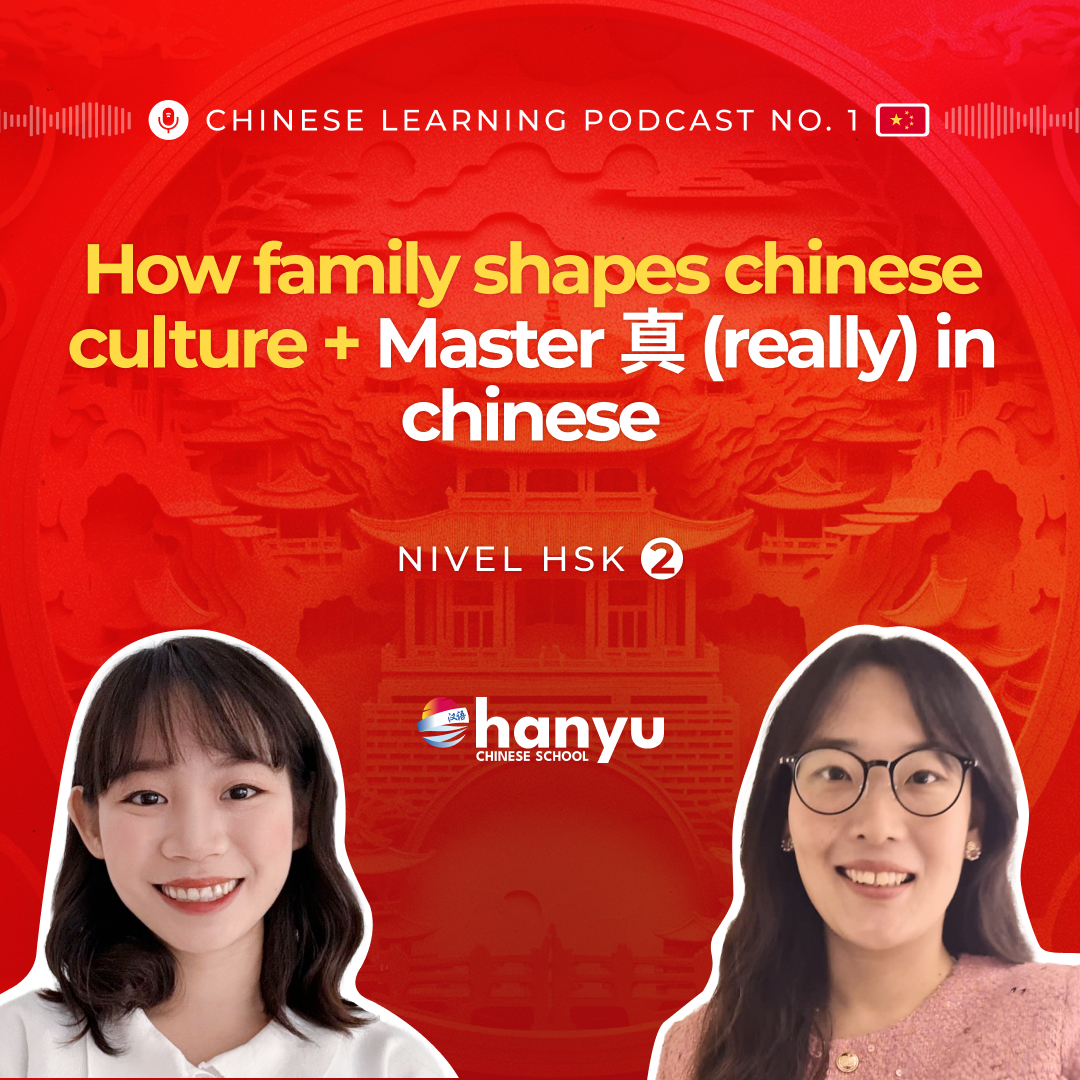Episode Transcript
[00:00:12] Speaker A: Hi, everyone.
[00:00:14] Speaker B: Welcome back to HSK podcast. I'm Vicki and here we have Emily.
[00:00:21] Speaker A: Hi, everyone, I'm Emily. And so today we are having a super exciting episode where we are going to teach you how to express your desire. Everyone has wishes, right, Vicky?
[00:00:35] Speaker B: Yes. Do you?
[00:00:39] Speaker A: Yes, of course. I want money to fill from the sky. Does that count?
[00:00:45] Speaker B: Yeah, of course. Of course. We also gonna learn how to say.
[00:00:49] Speaker A: That.
[00:00:54] Speaker B: These birds are very useful.
So whether you want something or you don't want something.
[00:01:01] Speaker A: So.
[00:01:03] Speaker B: This word will help you to express your desire more natural. Right, Emily?
[00:01:11] Speaker A: So the words are xiang and yao in Chinese.
And we got a very fun dialogue today and talking about careers, plans, future glow.
So let's see. Let's. Let's get it. Let's take a minute.
Okay.
Hey, Vicki.
Okay, sorry there's a delay.
No, no problem, no problem.
[00:02:10] Speaker B: Okay, okay, okay. I just want to check if you can listen me and see. See me is all right?
[00:02:18] Speaker A: Yes.
[00:02:18] Speaker B: Okay, good. Okay, before.
[00:02:22] Speaker A: Good.
[00:02:22] Speaker B: So before starting our dialogue, if you want to learn Chinese and you want to improve your skill, you're gonna love this episode. And also if you like to learn with us, you also have a free 101 class. Through our platform. We have courses starting from Euro 69, including live classes, record recorded lessons, and also a full access to our online campus. So don't forget to visit our website so you can hear. You have the link here. So yeah, you can start your path to learn Chinese.
Let's move on to our dialogue. So that setting is me and Emily, we sitting at a cafe discussing our career's goals.
So about what we want in the future.
So let's start.
Yes. So let's move on to our grammar section.
So let's start with.
With the grammar points from the dialogue with and yao.
[00:04:29] Speaker A: So we're gonna start with.
This verb is used when you want to do something or you have a desire to do something. It's more casual. And it can also mean about thinking or still considering something.
For example, I want to be a teacher. So in this case, express a desire to be a teacher, but it's more soft or wish.
The second one we have is so I would like to have Chinese food. I want to have Chinese food.
So.
So more about thinking or considering.
[00:05:17] Speaker B: Yes, that's right. And next, let's talk about yao. Yao is a stronger verb than shan, and it's also used to say that you really want something or you intend to do something. It's more direct.
And this verb has two main uses and it's super important. To understand the difference.
So the first one is for wanting something. Yao is used when you want something or want to do something. It's stronger than shan and it's used to express clear intention and desire. It's same as to say I really want or or I need something. In English. Let's see the example.
I want a cup of coffee. Here yao expresses a very strong desire for a specific thing.
A cup of coffee.
And let's see the second example.
I want a menu. Here yao is used when asking for something directly.
[00:06:35] Speaker A: The other use that we have is when you want to do something in the future, I'm going to do something.
So express a clear intention to take actions or to make plans. Like saying oh, I'm going to do something or I plan to do something in English.
So the examples we have here is I'm going to work tomorrow or we are going to start.
So here indicates that something will happen soon or someone intends to start an action.
So after that, let's explore the opposite.
[00:07:26] Speaker B: Yes, let's start with is used to say don't want to do something or don't feel like doing something.
Is commonly used to express a lack of desire to perform an action.
Let's see the example.
I don't want to work in an office.
Here pushan is used to declaim or express the lack of interest in doing office work.
[00:08:02] Speaker A: Very good. And then we have so meaning refusing to do something like they don't want to I don't want this job. So it's more direct than in the situation where you are refusing it.
[00:08:23] Speaker B: Exactly.
So to sum up, is equal to say want to do something softer and more casual.
While is equal to say that you want something or intend to do something stronger and more direct than and then you have you don't want to do something or you really don't want to do something or refuse to do something.
[00:08:55] Speaker A: So you can use these verbs in everyday conversation to express your desire and preference.
So the key is knowing when to use for softer desires or for stronger intentions.
[00:09:10] Speaker B: Exactly.
So let's move on to our question for our audience. Now it's your turn. How would you say I don't want to work today in Chinese?
[00:09:24] Speaker A: So write your answers in the comment section down below.
We will be happy to help you check and improve them.
Okay, so before we start up to the next one.
So like what we're saying, if you like this episode, if you enjoy this episode so far, please.
With our classes you can have even more progress. We are top rated online academy with over 3,000 satisfied students.
We offer courses starting from just €39 including group classes, recordings and 24,7 learning platform.
So if you would like to start it from step by step, try a free class and see for yourself.
So you would find everything that in our website hanyichineschool.com or listen to our podcast every episode on our campus where we have campus.honeychineschool.com podcast or campus.training.com podcast.
So we are happy to see you.
[00:10:44] Speaker B: All right, so let's continue with our lesson. Let's review what we have say in our dialogue.
What do you want to do in the future?
[00:11:07] Speaker A: I want to be a teacher because I love languages. How about you?
[00:11:17] Speaker B: I want to be a Chinese teacher.
[00:11:21] Speaker A: Wow, that sounds great.
Why don't you want to do other jobs?
[00:11:40] Speaker B: I don't want to work in an office. It feels too boring.
[00:11:54] Speaker A: I don't want to do that kind of job either. I like to work with different kinds of people.
[00:12:05] Speaker B: Looks like we both want to do interesting job, right, Emily?
[00:12:11] Speaker A: Yes, of course. So that's why we're here today.
[00:12:15] Speaker B: Yes, of course.
Well, after our review, let's move on to our cultural section.
Today we're going to talk about something very important in Chinese culture. The career choices. In China, the way people choose their careers is often shaped by the cultural values, the family expectation and the social norms.
[00:12:43] Speaker A: Yeah, that's right. So in China, education and careers are deeply connected.
From a young age, students are encouraged to focus on their studies and the Gaokao, China's National University entrance exam, plays a huge role in their future career path. So the better scores you get, the better opportunities in the university and careers.
[00:13:13] Speaker B: Yeah.
Yes. So that's why a lot of Chinese students feel pressure from their parents and the society to choose like very respectful professions like medicine, engineering or law. These careers are seen as stable and prestigious.
Many families push their children to towards them, believing it's a guarantee of a good life.
[00:13:44] Speaker A: So the people say that they like the careers that end with the word.
You heard that right, Vicky?
[00:13:56] Speaker B: Yeah, but you can explain what it is?
[00:14:00] Speaker A: Yeah. Okay. So for example, when you say professor, that ends with the word or lawyer, Lawyer also ends.
Ends with.
And if you say doctors also ends with.
So the thing is that if a career that ends with the word is more highly, you know, highly high salary, high people look up to. People normally look up to these kind of careers. So in Chinese culture, there is a strong value placed on family expectations and social statues.
So parents want their children to succeed and bring Pride to the family. So make, make them proud, you know.
[00:14:58] Speaker B: Yeah, I mean it feels like a lot of pressure and stress.
But things are changing. As China becomes more modern, there's a growing interest in creative fields like technology, design and media.
So some young people are now pursuing entrepreneurship or careers in startups. Even though these paths are seen as less stable compared to traditional professions.
[00:15:34] Speaker A: Like a lot of people nowadays will want to be a influencer, YouTuber, do whatever I, I do admire people could make their hobby into like videos or making on an Instagrammer and posted it. That is a really fresh new path for careers nowadays of course in people like in the elders and the Chinese elder, they would feel like this is something un unstable and this is also understanding because it is in some of the way it is.
But I would say it gives more opportunity to the young people and not only want to do not only following the path of the ancestor, but also creating their new path. Right?
[00:16:28] Speaker B: Yeah. Right.
Overall careers decision in China are shaped by the mix of tradition, family values and social expectation. As you say Emily, nowadays the people, the new generation are willing to choose other kind of path. They want more freedom in their career choices. So that's why people goes to careers like as influencer or YouTubers or design and technologies. Right?
[00:17:04] Speaker A: Yeah. And I also like the idea of not working in the office.
Of course it is a different kind of environment. People can work in wherever they want to.
A cozy coffee shop in the house or even an office environment that where they rent.
So wherever it makes you more focused on the and get the job done would be a good environment.
[00:17:36] Speaker B: Yeah, that's right.
Well, we talk about a very interesting topic today, right?
Yeah. So well, let's move on to the answer that we previously asked to our audience to write.
So how would you say I don't want to go to work today in Chinese?
[00:18:02] Speaker A: So the correct answer is you have it on the next slide? Yes. Thank you Vicky. So great job if you get it right.
And if not Vicky, what can we do?
[00:18:22] Speaker B: No problem, no worries. Keep practicing and you'll get there. And, and also you can learn more Chinese and practice in our campus hangyechineschool.com and of course we have to say thank you to you guys if you stay until now.
If you truly want to learn Chinese with real teachers, don't forget to visit our website, hanyinchinese.com school.com and book your free class.
Remember, we have courses starting from €39 and it also includes live classes, recordings and a very complete platform that helps you to progress step by step. Plus we have podcast organized in our campus so you can track your progress. You can visit campus.hangingchineschool.com podcast for for Chinese podcast or campus.trailam.com podcast for English podcast because we also.
You can also learn English there.
So before continuing, let's see you guys try to write a sentence using sun or yo in the comments.
We like to see what you come up with.
[00:19:54] Speaker A: Yeah. And challenge yourself. Try to use all four in one sentence if you can make it a huge sentence.
So and we'll be there to try to try to help you out. So please leave us a comment.
[00:20:09] Speaker B: Yes.
Well, let's, let's sum up what we learned today.
So we have learned how to use to express desire, preference and refusal. So these verses are very essential for talking about what you want or you don't want in different situation.
[00:20:36] Speaker A: Yeah. And we also explore career choices in China which are influenced by deep rooted cultural values like family expectations.
But it's fascinating how people changes how the environment is changing right now in the Chinese society.
[00:20:56] Speaker B: Yeah, that's right.
Well, in the next episode we'll dive in into a structure I Ching love to talk about. Completed action is a great way to express that something has already happened or have been done.
[00:21:12] Speaker A: And make sure to subscribe and like and share this platform.
Share this episode so you won't miss a lesson. Don't forget to practice.
If you want to practice with the native teacher, visit our websitechineschool.com for a free class today.
So thank you for listening and we will see you next time.
[00:21:38] Speaker B: Thank you. See you next time.
[00:21:57] Speaker A: Sam.


